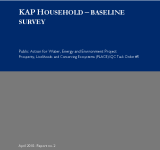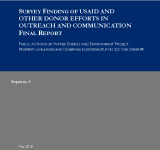The report is based on the KAP household baseline survey;; which measures the current awareness of methods of water and energy conservations to determine how the Jordanians currently dispose of their household waste and how serious they believe the threat of global warming to be in Jordan. The household baseline survey on the use of water;; energy;; and the management of solid household waste has been designed based on the Knowledge;; Attitude and Practice (KAP) model;; and it aims to serve as a prelude to education and changing public behavior in the water and energy sectors in Jordan;; and to supply specific initiatives in the environment;; in particular in regard to the management of solid household waste. The research is based on a qualitative research;; a questionnaire and semi-structured interviews. The report concludes with the main findings that the most trusted sources of information on water conservation were the Ministry of Water and Irrigation;; and the Jordan Water Company. The survey finds that the respondents believe that the water shortage can be overcome with the water authorities' leadership including their engagement in grand projects.

